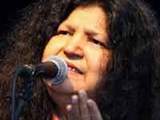Abida Parveen was born in Larkana, Sindh, Pakistan, where her father, Ghulam Haider, ran a music school. Though women in Muslim society are rarely encouraged to pursue musical (or other performance) careers, her father recognized his daughter's extraordinary talent at an early age and encouraged her to sing.
Her career crystallized after her marriage to the late Ghulam Hussain Sheikh, a senior producer in Radio Pakistan who became her mentor. She studied classical vocal music with Salamat Ali Khan.
Abida Parveen is considered by many as one of the greatest singers of the sufiana kalaam.
Everything about the artist is noticeably different from her contemporaries. A loose full-sleeved kurta and shalwar with Sindhi ajrak chadar draped over her shoulder is the trademark dress of Abida Parveen. With no make-up on and very little adornment of any kind she comes of as a devoted and honest performer of her craft. It's this faithful devotion to the Sufi's that brings about the kind of intensity that over powers the audience.It's a pleasant experience listening and watching her sing. Abida is clearly at her best with the Punjabi Sufi poetry of Bulle Shah and Waris Shah. Much like Nusrat Fateh Ali Khan her awesome power to involve the listener in her state of passion lies in her voice. Be it Punjabi, Sindhi, Urdu or Saraiki, all lyrics are rendered with the same intensity having a captivating effect on the audience

















comment:
p_commentcount